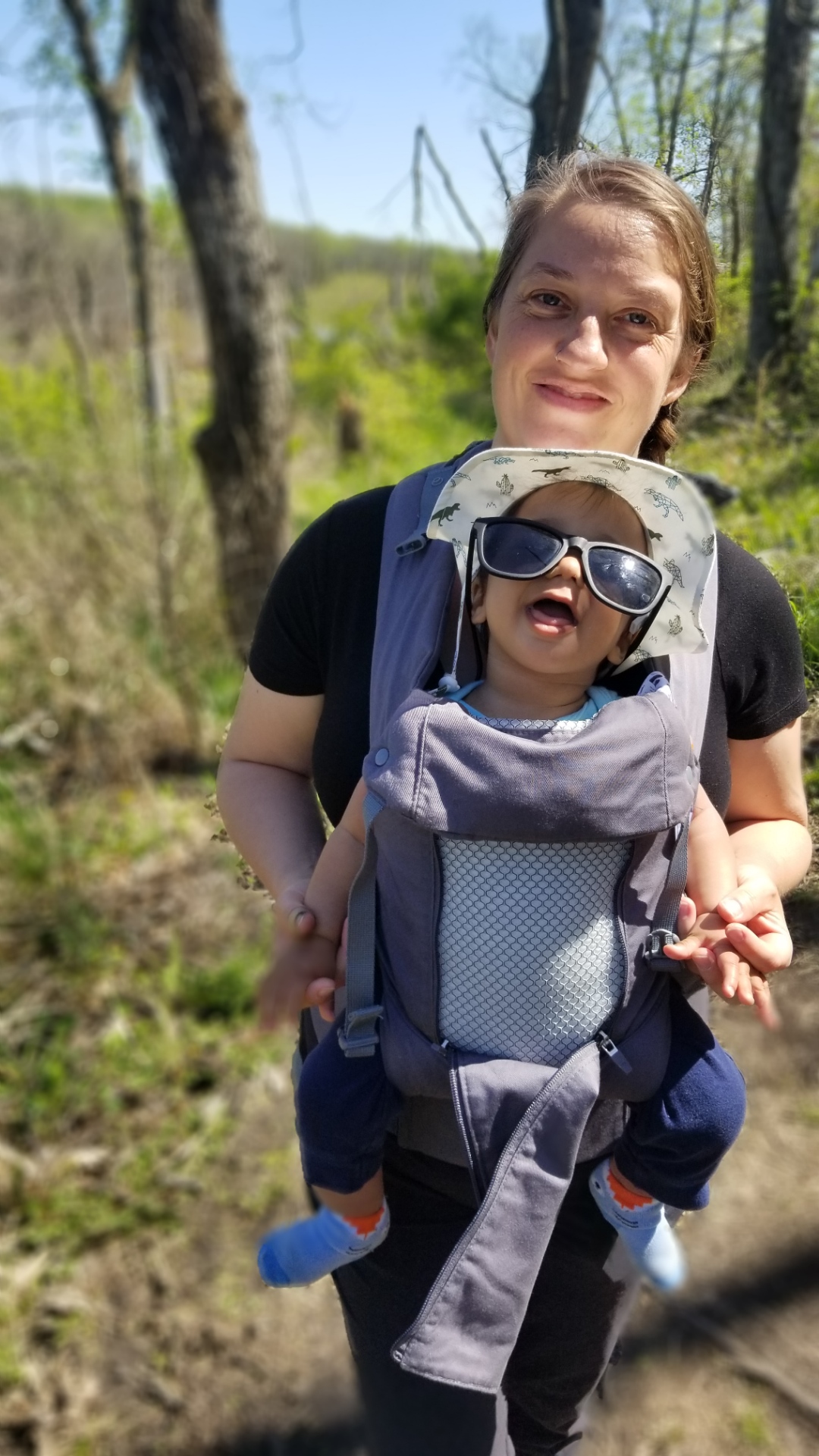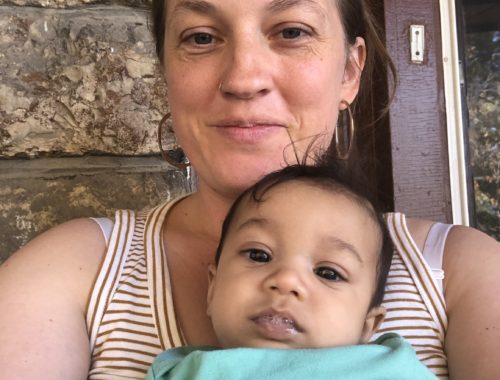I’m sitting across the table from an older gentleman dressed in a suit, no tie. We’re at a coffee shop that’s live-streaming a video from the National Parks website in the background, a stack of paperwork in front of us. He’s asking questions about my assets and the kind of portfolio I’d like for my retirement funds.
It’s late afternoon and the baby is home napping, a miracle after all of the sleepless nights and days of the first year of his life. The fact that I can leave the house during a two-hour window (while Prasun is working from home in the next room) means I can now do things like meet with a financial advisor in the middle of the day.
This time last year, little one wasn’t even big enough to put in a baby carrier so I could wear him around the house.

Things with the advisor are mosying along until he gets to a section about my employment status. The funds we’re consolidating are from my previous job at After the Harvest and more recently, the two years I spent working as a school nurse during the pandemic. I squirm in my seat as he checks the “Unemployed” box and then writes in, “Housewife” as an explanation.
Housewife?
I feel my cheeks flush. Is that really the best way to describe the unpaid hours of labor I’ve spent raising a tiny human for the last thirteen months? Does being a housewife imply I’m married to my home?
There’s a generational gap between us, so I let it slide. But what I can’t ignore is my own discomfort. Why do I have a difficult time acknowledging the 24/7 work that goes into ensuring someone else’s survival? The physical act of feeding someone from my body all day/night, the mental load of adaptation as his growth and development accelerate, the ever-changing job description, or the inability to take a sick day.
Motherhood is unlike any job I’ve ever had and mothers all over the world are doing it without earning a penny. In fact, creating and nurturing a new life is costing most of us– promotions, friendships, hobbies, sleep, exercise, and more (the subject of maternal/infant mortality rates among African Americans and people of color is a discussion for another day but to say black women are disproportionately risking their lives when giving birth due to racial inequality is just fact).
Are we doing it wrong?
One thing I’ve noticed is the huge difference between being pregnant and having a newborn. An alternate title for this essay was “The Elevation and Degradation of Motherhood,” because it honestly feels like a confusing paradox we have to embody. Pregnant women, for the most part, seem to experience a temporary, elevated place in society. Strangers constantly smile at us and want to rub our bellies. People are nicer, in general, and accommodating.
This seems to go out the window as soon as our babies are born. There’s the unspoken but very real pressure to keep them quiet almost immediately. Suddenly, the people who held doors open to make room for your pregnant belly won’t do the same when you’re pushing a stroller. Whereas pregnant women are portrayed as “glowing,” fertile, and sacred, new mothers of infants are portrayed in the media as ragged, unshowered, and depressed/manic. There is an abrupt shift– from elevation to degradation.
Motherhood suddenly becomes a mockery.
There’s the toxic “bounce back” expectation but there’s also a gaping lack of support and resources to help new mothers navigate the transition to full-time caregivers. In the U.S., there’s no standard maternity leave, which means most moms-to-be are stashing away their vacation time to make up for an impending lack of income. Childcare options are paltry (many daycares have wait lists of a year or more) and safety concerns about formula and baby foods many working parents depend on, abound.
If you want to know how our society values its non-working members, just try to get around with a wheelchair or stroller. You’ll immediately notice our preference for able, working bodies who can keep the machinery of capitalism well-oiled.
The more I notice it, the more questions I have. Is our elevation of the pregnant woman and unborn life just a glorification of our growth potential? Does the degradation of new moms and motherhood, in general, speak to how little we value the messy process of becoming? Of the actual growth itself and the effort and time it takes?

It seems like we are trained to skip the in-betweens. Celebrate the beginning and the end (producing capable factory workers) but ignore the middle and dispose of the leftovers (the elderly) once they’re no longer capable of “contributing” to society. (I’m being facetious, but I’ve spent enough time caring for the elderly in my nursing career to understand how poorly we do it).
So, what are the consequences of continuing this way?
In considering future childcare options for our little one, I came across an interesting review of the literature on the data about daycare centers. One of the key takeaways was the correlation (especially for males) of an increase in long-term aggressive behaviors for children placed in daycare before the age of four. There are a lot of nuances here, but I can’t help but make the connection between the extreme violence we experience in our country and our lack of resources for parents (like paid paternal leave).
There are other connections to make, too. The AAP’s recommendation to exclusively breastfeed for the first year is nearly impossible for working moms but how is that impacting the health of future generations? One of the other correlations the paper made was the high levels of cortisol (a stress hormone) children experience in daycare and the effects that has on their immune systems. As a school nurse, I know the negative effects and stress caused by parents having to miss work to stay home with sick kids in a seemingly unending cycle of illness.
We could also talk about divorce rates and birth rates and how the nuclear family as it’s currently structured is called “nuclear” for a reason. How many people have wondered if their marriage is a ticking time bomb because the pressure is more than two people should have to sustain? Or how many of us are the byproducts of an explosive family dynamic because it was too much for our parents, too?
Not all of our societal ills can be traced back to mothering/parenthood, but I think a lot of them can. I think they are clues for how little we value what we say we do. And why I can relate to the frustration of pro-choice folks who cannot wrap their heads around forcing women to birth children who may become future victims of gun violence AT SCHOOL.
We are still in survival mode. Noah is happy and healthy but it’s taken a toll on both of us to make that happen. It’s not a sacrifice we’re unwilling to make, but sometimes I wish it was one our society valued (or acknowledged) more appropriately. Perhaps it could start with a form? Adding a box for “Full-time Caretaker” or “Paternity leave” (kind of like the retired box?) instead of checking “Unemployed?”
It could, of course, begin with me, gently asking the gentleman across the table from me to cross out “Housewife” and write in Mother, because that will always and forever be, a full-time job.

What do you think? Have you experienced this paradox? I’d love to hear your thoughts!
Google+



7 Comments
As a stay-at-home parent myself, I resonate with the struggle to be recognized beyond the label of “housewife” and to acknowledge the immense, unpaid labor of caregiving. It’s a poignant reminder of the need for societal reform in how we perceive and support caregivers.
Thank you for commenting! I know so many of us are facing the same challenges. It definitely speaks to a broader societal need for a shift in how we see caregiving and the value of human life.
You are a beacon of hope and comfort to those who are in need, and your caregiving skills are truly unmatched.
Thank you for your generous words. You’re appreciated!
Thank you for sharing this honest and thought-provoking reflection on the role of a housewife. As someone who has struggled with the expectations and judgments surrounding this role, I appreciate your candid perspective on the challenges and rewards of being a homemaker. Your writing is engaging and relatable, and I believe that many readers will find comfort and validation in your words. I also appreciate your recognition of the value and importance of all kinds of work, whether it’s inside or outside the home. Thank you for your contribution to this important conversation, and for your commitment to supporting and empowering women in all walks of life.
Sophie recently posted…L’Apprentissage De La Marche Chez Les Bébés [Guide Complet]
I love this, Mariah. You are right about it all. We are in a crisis and there are many aspects contributing to a very damaged (and ill and unhappy) society. It does not have to be this way and I love that you are being a force for change. Only by examining our values and by speaking out, like you’re doing, will we be able to create something better. Thank you!
Thank you so much for reading and responding, Sandra! I honestly feel so much rage about it all sometimes, it’s hard to know where to start to create change. My hope is that by naming some of the fault lines we can stop blaming ourselves as mothers and caregivers and begin to move to more stable ground, together.